Recently I read an article in Forbes about how Yvon Chouinard, founder of Patagonia, was giving the millions his company had saved in a recent round of Trump induced tax cuts to fund grassroots environmental causes.
I’ve often wondered what the world might have been like if Chouinard rather than Trump was President – one after all perhaps epitomises the American dream and tropes of classic masculinity. Ruggedly handsome, an adventurer who rose from humble immigrant origins to set up a globally successful business and is now a philanthropic multi-millionaire. The other of-course is Donald Trump, a fat, racist trust-funder with shit hair.
I digress.
As a lifelong fan it reminded me of some Patagonia inspired graphics I made whilst living in my van in the Old Dungeon Ghyll car-park in the Lake District.
Although far from finished (the lack of kerning in these graphics still makes my eyes bleed) and whilst created with my tongue ever so slightly in cheek, I thought I’d write on a slightly deeper level about the motivation behind their development and how I wanted to explore ideas surrounding identity and how we might represent this visually.
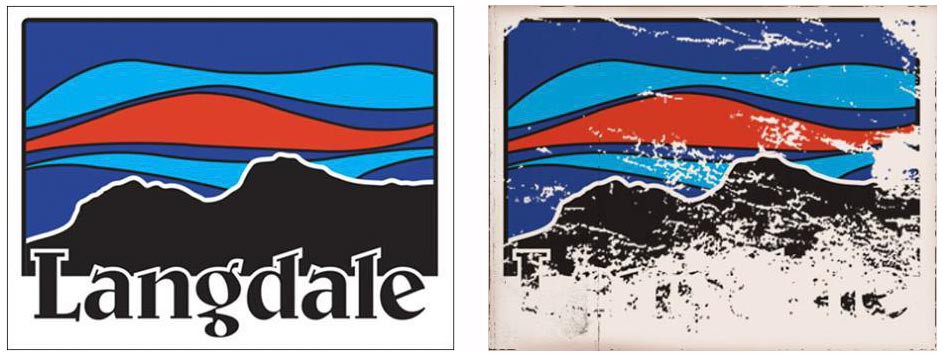
My homage to Yvon Chouinard, Patagonia and the dirtbag / dharma bum lifestyle from my base in the Old Dungeon Ghyll car park. I probably overdid it distressing that second image..
I’ve always subscribed to Chouinard and Patagonia’s ‘live simply’ ethic and the idea of living my life in pursuit of the cleanest line. Like some form of modern day dharma bum(s), myself and many of my friends chose to live with less, climb, fill our lives with life-enriching experiences and travel eschewing possessions and careers.
As a designer and musician (I played guitar in funk and hip hop bands many years ago) I’ve always been fascinated by and drawn to DIY culture – whether old punk and skate zines, the cut and paste styles of Jamie Reid, Swifty’s re-use of the everyday, Banksy’s satirical parodies or the sample driven hip-hop of A Tribe Called Quest or the Beastie Boys.
Making something from the old or familiar inspires me, primarily I guess because a pre-formed emotional connection or intellectual interpretation exists for us to play with
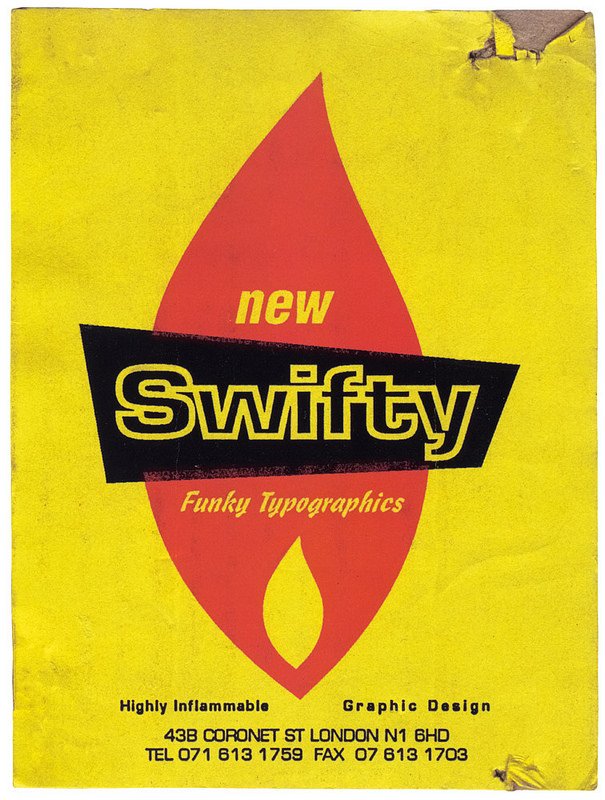
A perennial fave. Swifty’s Highly Inflammable Graphic Design, the design for which was taken from a Ronsonol can – “the best lighter fluid used by every graphic designer”.
Hip-hop might seem an odd example to cite for inspiration, however Nelson George once referred to hip-hop as the first genuinely post modern form of music, one where nothing was perhaps original, or rather new, just re-assembled, Pastiche perhaps? This was often applied to visual language within the genre aswell as breaks, KRS-One’s sample heavy Malcom X inspired By All Means Necessary is a great example of this, it took an image of Malcom X that shocked America, put it in a personal, political and contemporary context and was anything but a cheap steal.
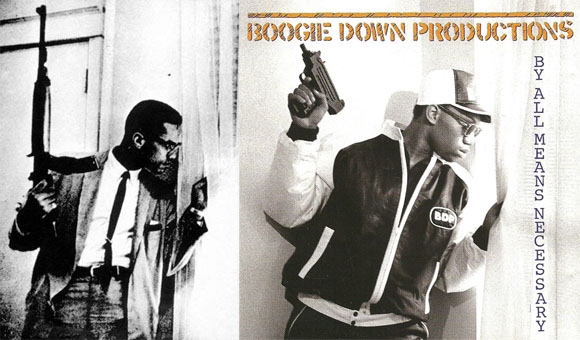
I really like this quote by Jim Jarmusch, the ‘select only things to steal from that speak directly to your soul’ especially..
“Nothing is original. Steal from anywhere that resonates with inspiration or fuels your imagination. Devour old films, new films, music, books, paintings, photographs, poems, dreams, random conversations, architecture, bridges, street signs, trees, clouds, bodies of water, light and shadows. Select only things to steal from that speak directly to your soul. If you do this, your work (and theft) will be authentic. Authenticity is invaluable; originality is non-existent. And don’t bother concealing your thievery – celebrate it if you feel like it. In any case, always remember what Jean-Luc Godard said: “It’s not where you take things from – it’s where you take them to.”
Re-cycling the Patagonia logo
I arrived in the Langdale valley in July 2012 after several years on the road alternating between the States, Switzerland, France, Spain and of-course Yorkshire. A few years prior I’d sold pretty much everything I had to travel, climb and live life a little differently. Sadly for me 2012 began to mark the end of my intinerate ways, my body essentially falling apart after years spent bouldering at my limit, but having the Langdale valley as a lounge, kitchen and bedroom was a great place to contemplate my next move.
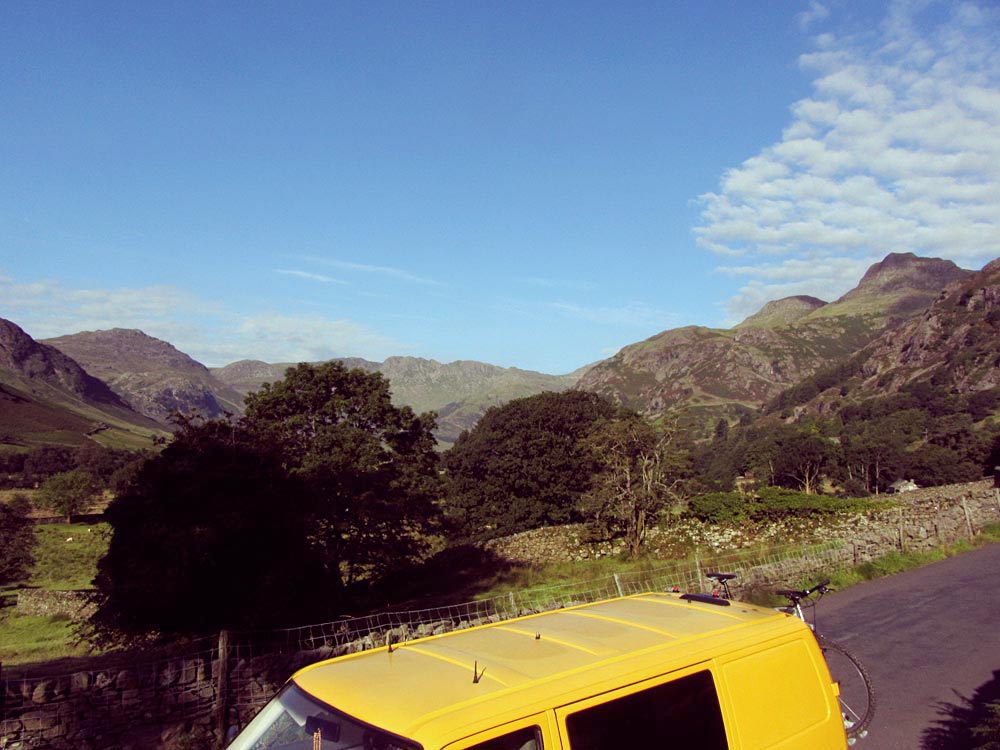
A snap of the Langdale Valley with the old place in the foreground.
Whilst working at the Lakeland Climbing Centre I was always moved by the silhouette of the Langdale Pikes on my way back into the valley each night, seeing that skyline always felt like home was near – if you can call a car park and an old AA van home.
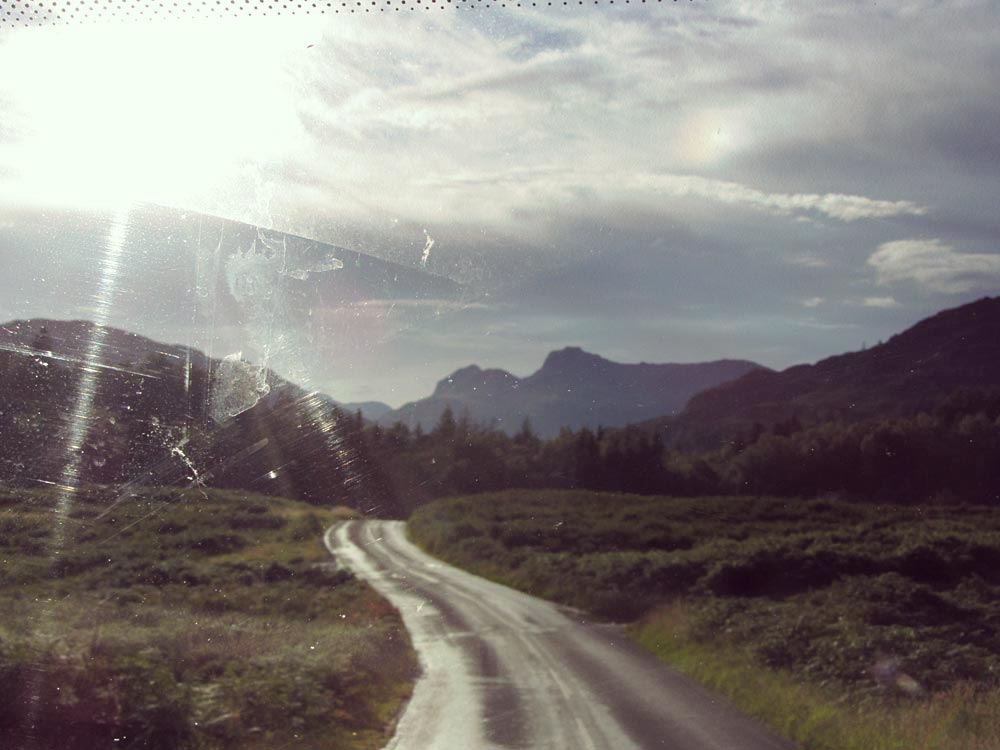
Not the greatest photo, but where where an idea began to be formed. On reflection I should have probably given my windscreen a clean.
Similarly making coffee in the van first thing every morning I often looked at the Patagonia sticker on my units and reflected about where I was, what had brought me here, what inspired me and where I wanted to go next.
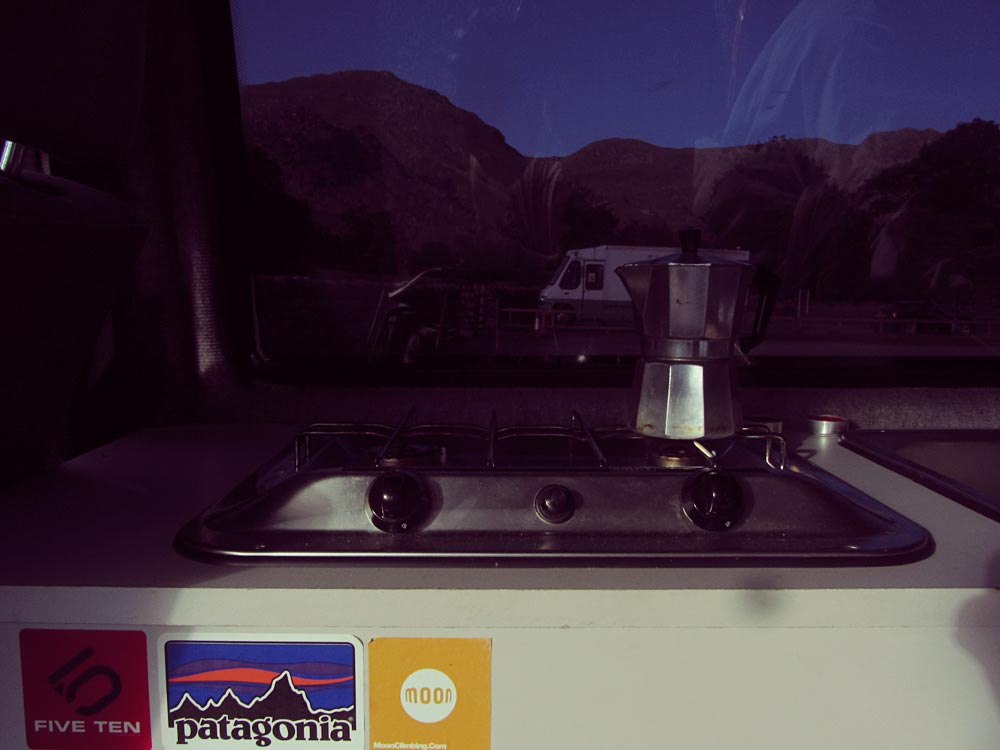
Some stickers and a typical ODG dawn from 2012.
My slightly tongue in cheek creation seemed the best possible way to sum up where and who I was. Without our pre-formed knowledge and interpretations of what Patagonia, it’s brand and logo represent I couldn’t re-cycle and play with this to explore my own belief systems, identity and location and that which had brought me to this place and point in my life, what I was proud to represent; the cleanest line, bouldering, music, graphics and a little bit of dharma.
Put together in Illustrator on my Macbook, in a van, in a car park steeped in Lake District climbing history I figured Yvon wouldn’t mind too.